Download PDF Back to Research Paper Series
| Suggested Citation: Rich, Dave. 2025. "Shoah Revisionism After Gaza." ISCA Research Paper 2025-1. |
Download PDF Back to Research Paper Series
| Suggested Citation: Rich, Dave. 2025. "Shoah Revisionism After Gaza." ISCA Research Paper 2025-1. |
by Dr. Dave Rich
January 2025
In October 2024, Novara Media, a left-wing news web- site based in the UK, published an article by Palestinian author susan abulhawa that surveyed the suffering of Palestinians in Gaza under Israeli assault and concluded: “Israel is committing the holocaust of our time, and it is doing it in full view of a seemingly indifferent world.”[1]
Although it was very much in line with their politics, this was no ordinary Novara Media op ed: in fact, it was not supposed to be published by them at all. abulhawa had been commissioned to write it by the Guardian, and they would have published her article but for one thing, or rather, one word: “Holocaust.” According to abulhawa, the Guardian’s most senior editors refused to publish the piece unless she removed the word “Holocaust.” In a series of back-and-forth emails they suggested she use “genocide” as an alternative, but abulhawa refused and ultimately lost the commission. “Given the magnitude, the unceasing horror, the hateful glee and sadism at our suffering,” she wrote in one email to the paper’s editors, “the only word I have at my disposal that comes close to capturing what’s happening is ‘holocaust’ I am not going to play this western media game of tiptoeing around the feelings of our tormentors. Nazis were not so cruel.”[2]
The claim that Israeli actions in Gaza display greater cruelty than the Nazis showed during the Holocaust is objectionable enough, but also now wearily familiar. It is a form of indirect Holocaust denial in its own way, and ought to bring disrepute to anybody who says it, and any outlet that publishes it. However, it is abulhawa’s insistence that “Holocaust” is the only word she was willing to use to describe events in Gaza that feels significant. She told Novara that in her view “Holocaust” is simply a word like any other, as if her refusal to consider any other option was a purely lexicological choice unrelated to the fact that Jews were the victims of the Nazi Holocaust and are now, in her view, the perpetrators of a Pales- tinian Holocaust. This, surely, is disingenuous. If it were only a matter of finding appropriate terms to describe the undoubted suffering of Gazans in this latest war, there are plenty of options that do not invoke memories of the Nazi extermination of European Jewry. But “Holocaust” is not just another word: it is a political and moral concept of unmatched gravity in the postwar West, and abulhawa is just the latest opponent of Israel to try to harness its power.
In truth, she is not alone. Conversations about antisemitism often relate, directly or indirectly, to the Shoah, and after October 7 it felt at times as if everybody’s responses to the terror attack on Israel by Hamas and other Palestinian armed groups were shaped, one way or another, by the shadow of the Holocaust. For Israelis and Jews around the world, it evoked difficult, traumatic memories. For some, these memories were intensely personal: around 2,500 Holocaust survivors lived in the com- munities of southern Israel that were directly affected by the Hamas terror attack. For others, they were assumed, collective memories that continue to influence Jewish sensibilities. As defenseless Jews were slain in appalling ways and Jewish hostages were dragged away on that awful Saturday morning, it was as if the entire Jewish people was being dragged back into their own history at its worst.
It is understandable that Israelis, and Jews around the world, would have this visceral response to the scenes and stories that emerged from Israel on that day. This reaction was genuine and spontaneous, a moment perhaps for historians to pause and allow emotion some space before explaining the factual ways in which past and present do differ from each other. At times, unfortunately, this sentiment was channeled in ways that appeared performative and rather crass, such as the decision of the Israeli delegation to the United Nations to wear yellow stars on their jackets, in the manner of Jews under Nazi rule, during a General Assembly debate on the conflict in Israel and Gaza. But it is difficult to resist the potent symbolism of the slogan “Never Again Is Now” projected onto Brandenburg Gate in Berlin on the 85th anniversary of Kristallnacht, just five weeks after the October 7 massacre. The commemorations for that anniversary required extensive security: a Berlin synagogue had been firebombed just three weeks earlier, as anti-Jewish hatred surged after October 7. This was history and present day reality seeming to meld as one: at least, that is how it felt to many Jews at the time.
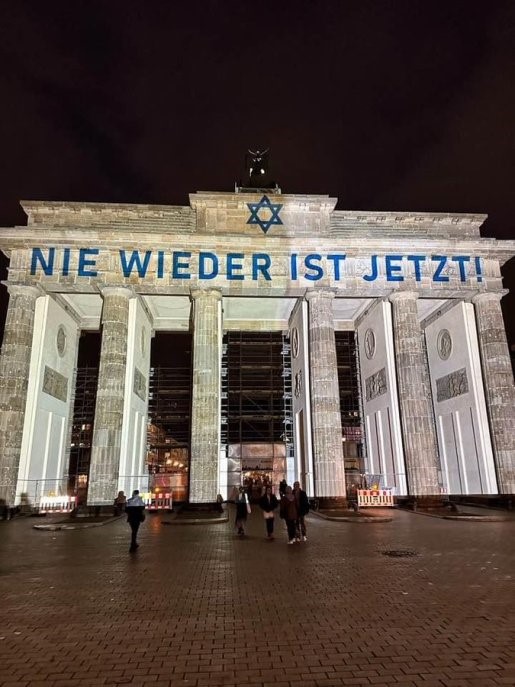
Reliance on the Holocaust as a reference point for arguments overIsrael and antisemitism, always common enough, became ubiquitous. Some supporters of Israel went further than simply drawing a compari- son between the atrocities of October 7 and the Holocaust by arguing that Hamas and its allies are, one way or another, more antisemitic, more murderous, and less limited by conventional morality than the Nazis were. Evidence for this was found, so it was argued, in the way that Hamas filmed its atrocities and livestreamed them to the world, whereas the Nazis went to great lengths to hide their mass murder from sight, which supposedly proved, according to some commentators, that SS members were not proud of their actions, unlike the exhilaration of Hamas fightersas they boasted of killing Jews.[3] It’s an argument that superficially seems plausible, and it is true that the Nazis sought to conceal their crimes whereas Hamas broadcast theirs: but that isn’t because the Nazis were ashamed of what they did. The reason they disguised the evidence of the Holocaust while it was ongoing is not because they knew it was wrong, but because deception was essential to the smooth running of the Nazi killing machine. The logistics of corralling, transporting, and murder- ing six million Jews, often with relatively few SS men or local auxiliary and police forces to do the dirty work, required total control over the Jewish populations in question. The Nazis went to great lengths to avoid any panic and terror amongst their victims, because terror would lead to chaos, and chaos would disrupt the production line of death. In contrast, where the Nazis wanted to avoid terror, Hamas wanted to generate as much terror as possible. They filmed their grisly crimes on October 7 and broadcast them on their own social media channels as an act of psychological warfare intended to strike fear and terror into the Israeli population.
The Nazis were no more ashamed of their mass murder than Hamas are now; if anything, they thought they were doing the rest of humanity a favor. SS leader Heinrich Himmler notoriously told senior SS officers in a 1943 speech about what he termed the “extirpation of the Jewish People”: “This is a chapter of glory in our history, which has never been written, and which shall never be written . . . we have carried out this most difficult task out of love for our own people. And we have suffered no harm to our inner self, our soul, our character in so doing.”4 No sign of shame there. As for their attempts to cover up their crimes as the war came to an end by dismantling the extermination camps and forcing the remaining inmates on death marches away from the front lines, this was simply a matter of self-preservation, to avoid the retribution they knew would come. Many Nazi war criminals went to the gallows or committed suicide, unrepentant and convinced they had been fighting a just war against a cosmic Jewish enemy. And unsurprisingly, Hamas now deny that they deliberately murdered civilians on October 7, even though they filmed themselves doing exactly that. They aren’t ashamed of what they did either; they just know it looks bad.
As this example shows, whatever the motives for making this historical comparison, even if it is done with the intention of supporting Israel and condemning antisemites, it always ends up distorting or diminishing one aspect or other of the Holocaust. Arguing that Hamas are worse than the Nazis indirectly has the effect of reducing the depth of Nazi depravity by comparison, even if that is not what is stated or intended.
Still, any misleading equivalences or flawed comparisons made by supporters of Israel are as nothing compared to the unrelenting avalanche of bad faith, malign and ignorant distortions and abuse of the Holocaust that have become entirely normalized within anti-Israel discourse. Every anti-Israel demonstration features countless placards comparing Israel to Nazi Germany, Israeli politicians to Hitler, and Gaza to Auschwitz. You’ll hear it on radio phone-ins and TV debates, while #GazaHolocaust trends repeatedly online. Even Holocaust museums and archives have been targeted: “Gaza” was daubed on the sign of Lon- don’s Wiener Holocaust Library in November 2023, and a pro-Palestinian demonstration was called outside the Holocaust Memorial Museum in Washington DC, although that was subsequently cancelled after an outcry. You find it at the highest levels of Palestinian politics: Mahmoud Abbas blamed Israel for “fifty Holocausts” in 2022, and the following year in a speech at the United Nations he compared Israel to Nazi propa- ganda chief Joseph Goebbels. The Hamas charter accuses Israel of “Nazi treatment” of Palestinians. It is difficult to convey just how ubiquitous this is, and how much it goes unchallenged in anti-Israel circles. It would be banal were it not so grotesque.[5]
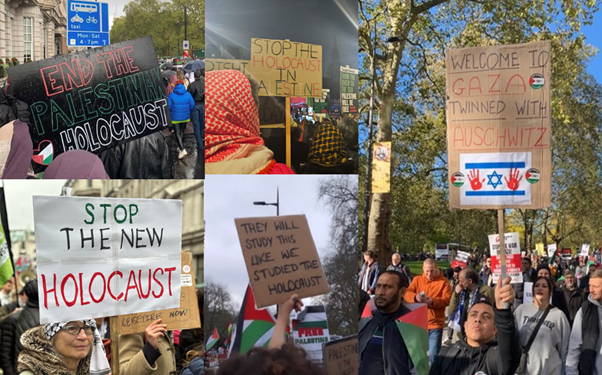
There are lots of reasons why people do this. Some of it reflects a well- meaning, if perhaps naïve, effort to use the idea of “Never Again” as a rallying cry for peace and humanity in today’s world. However, this is the exception rather than the rule. Most of the time when people invoke the Holocaust to criticize Israel, they do not have such admirable motives. For some, it is an exercise in finger-wagging at the Jewish people, as if they failed to learn the right lessons from their own near miss with exter- mination. For others, there is gleeful relief that they no longer need to listen to Jews going on about the Holocaust, because now those same Jews are behaving just like the Nazis did. There’s a sense of bringing the Jews down a rung or two on the hierarchy of competitive victimhood, allied to a belief that any political or societal benefits derived from this will transfer on to other, more deserving, groups. Then there is the sheer taboo-busting pleasure of doing something so monumentally offensive in the name of anti-racism and human rights. The one place a person of the left can wave a swastika around without worrying about losing their progressive status is, with no irony at all, on a march against the world’s only Jewish state. It’s how self-identifying anti-racists get to experience the transgressive thrill of pretending to be Nazis for a day.
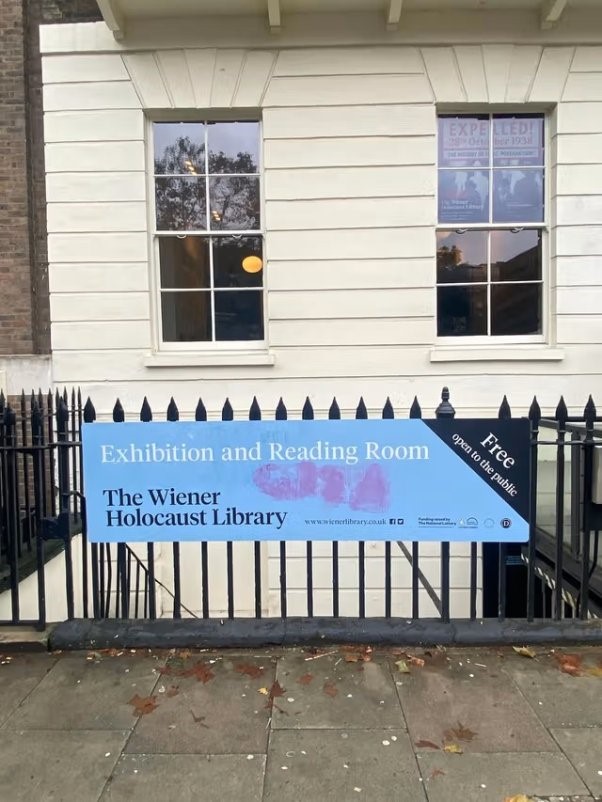
There is a much less vulgar version of the widespread accusation that Israel is committing a genocide in Gaza. This has, of course, reached the status of a formal case at the International Court of Justice, which will presumably follow due process in adjudicating on that case. In that respect, it is worth noting that talk of a genocide in Gaza began within just a few days of the October 7 attack, and often came from people who had already been arguing for some years that the Palestinians were being subjected to a ‘slow genocide’ by Israel. The alacrity with which so many of these anti-Israel voices began to proclaim a genocide in Gaza so soon after October 7 almost gave the impression of a ghoulish anticipation that events seemed to be catching up with the discourse, rather than the discourse following and describing events.
Buried within this world of Nazi comparisons and genocide allegations lies an intellectual effort to construct an argument that Israel’s sins are so egregious, the Jewish people—or at least, those Jews who have been seduced by Zionism—have lost the moral standing to continue as the guardians of Holocaust memory. Perhaps the most serious and thoughtful example of this came in a 7,500-word essay in the London Review of Books in March 2024, written by the author Pankaj Mishra, titled “The Shoah after Gaza.”6 Drawing on the writings of Holocaust survivors such as Primo Levi and, especially, Jean Améry, as well as Israeli intellectuals and writers including Boaz Evron and Yeshayahu Leibowitz, Mishra sketched a portrait of an Israel in thrall to paranoid victimhood and “a pitiless national ethos” that is replicating the darkest episodes of human history. According to Mishra, Israel has “turned the murder of six million Jews into an intense national preoccupation.” He quotes Leibowitz accusing Israel of “Nazification” and Evron warning that Israel is displaying “racist Nazi attitudes,” and Mishra himself con- demns “the liquidation of Gaza”—a form of words that seems to mimic the Nazi liquidation of Jewish ghettos during the Holocaust. At the same time, Mishra argues, diaspora Jewry since the 1960s, especially but not only in the United States, has willingly gone along with the instrumen- talization of Holocaust memory in the service not only of Zionism but of the Western post-war political order.
Having set the scene, Mishra then turns to the calamity that has befallen Gaza since October 7, which in his view is a massacre enacted with unbridled brutality by the Israeli military. In the chronology of his article, it is hard to escape the conclusion that this is the product of Isra- el’s national, Shoah-entrapped psychosis. Indeed, it is Israel’s “distorted consciousness of the Shoah” that led to October 7 in the first place, he writes, as “the victims of Israel, unable to endure their misery any longer, [rose] up against their oppressors with predictable ferocity.”
Mishra’s verdict on what this all means for the world as a whole is calamitous: “Israel today is dynamiting the edifice of global norms built after 1945,” and as a result “We are witnessing some kind of collapse in the free world.” The reason why Mishra argues this conflict would have such a cataclysmic consequence when, for example, the much larger death tolls in wars in Yemen, Syria, and Sudan do not, is because the Shoah and antisemitism were the “universalist reference points” for the system of international law and human rights institutions constructed after World War Two. If that rules-based system is now falling apart, then Israel’s actions are more potentially damaging in this respect than any other country’s wars or human rights abuses. “Netanyahu and his cohort threaten the basis of the global order that was rebuilt after the revelation of Nazi crimes,” he writes, because it was the revelation of Nazi crimes that was the moral foundation for the postwar global order. The obvious meaning is that it is Israel’s Jewishness that gives it this significance, because it is Jewishness that uniquely connects Israel to the Shoah. The war in Yemen cost hundreds of thousands of lives and was prosecuted by Saudi Arabia and the United Arab Emirates, both of whom relied on Western arms and political support while their oil and gas continued to flow, but that apparently posed no comparable challenge to the international order. Russia’s invasion of Ukraine saw one of the five permanent members of the United Nations Security Council—the highest global body responsible for maintaining international peace and security—flagrantly breach the most fundamental principle of the entire international system, that of the territorial integrity of sovereign states, but according to Mishra Russia’s actions only left those international institutions “tot- tering”: it is Israel alone that is “the portent of the future of a bankrupt and exhausted world.”
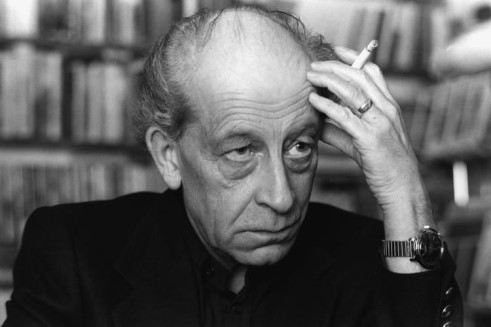
There is much to unpack in his argument. First is Mishra’s selective quotation of Holocaust survivors to add authority to his own argument. He relies heavily on the writings of survivor philosophers to build his case against Israel, most notably Jean Améry, but only when it suits him. The parts of Améry’s writings that Mishra uses are those where Améry criticised what he saw as a rising chauvinist bellicosity in Israel on his only visit to the country in the 1970s, and his specific horror at reports of the torture of Arab prisoners in Israeli jails.[7] It is true that he felt no affin- ity with Israeli culture and society, just as Jewish religious traditions, which were not part of his upbringing, left him cold. But Améry was also in no doubt that Israel’s existence was a necessity, not only to ensure Jewish survival, but for Jewish pride—and this part of his writings, a central, consistent part, Mishra does not use. Not only does he not rely on it: he dismisses it in passing without ever truly considering why, for example, Améry said that it was antisemitism that made him a Jew, and being a Jew meant he stood with Israel “when push abruptly comes to shove.”[8] Améry was not a Zionist, but he was very much an anti-antizionist, arguing that “Anti-Zionism is nothing other than an updated version of the age-old and evidently ineradicable, utterly irrational hatred that has been directed against the Jews since time immemorial.”[9] Indeed, there is some irony in Mishra favorably quoting Améry while com- plaining that Israel and diaspora Jewry—or “Jewish organizations that became notorious for policing opinion about Zionism,” as Mishra put it—have instrumentalized the Shoah in the service of Zionism, when it could be argued that Améry himself did this repeatedly. “Anyone who questions Israel’s right to exist,” he wrote in 1973, “is either too stupid to understand that he is contributing to or is intentionally promoting an uber-Auschwitz.”[10] Four years earlier, in a 1969 essay titled “Virtuous Antisemitism,” Améry admitted that “all my leftist friends will tell me that I am joining the battalions exploiting the six (or let it be just five or four) million murdered Jews to blackmail public opinion. This is a risk worth taking. It is a smaller risk than the one my friends would have us take when they plead for the self-disbandment of the “Zionist” state of Israel.”[11]
Mishra bypasses all of this to instead use Améry to add moral weight to his own argument, and it is worth thinking in more depth about why his essay relies so much on Holocaust survivors, not for what they have to say about their experiences under the Nazis but for their politi- cal views of Israel several decades later. David Nirenberg, whose book Anti-Judaism remains the touchstone for anyone trying to understand and explain antisemitism through the ages, warned that “we cannot be confident that our own understanding of our world is not itself being shaped by old habits of thought, including those habits of thought I will call anti-Judaism.”[12] In that spirit, and with that idea as our guiding prin- ciple, we will to explore the ways in which Mishra’s essay echoed some of those “old habits of thought.”
We live in a time when, especially but not only on the political left, victimhood is revered as the highest moral status that can be attained. It brings an unmatched and unanswerable authority to those who bear it, and Holocaust survivors are, for obvious reasons, the archetypal vic- tims of the twentieth century. They went through the worst suffering, therefore they produce the most virtuous wisdom, is how the logic flows. Holocaust commemoration has become part of our national conscience, and within that, Holocaust survivors are treated not only as witnesses to evil—which they undoubtedly were—but as modern personifications of the idea that suffering creates a kind of moral purification, giving their testimony a sanctified quality. It is important to remember that this ven- eration of those who suffer is not a modern invention of the political left, but ultimately derives from Christian theology and Jesus’s suffering on the Cross. Christianity still provides the moral framework for our secu- lar world, now expressed through the language of human rights rather than religious teachings, and this is one way in which it shapes our thinking even about people who are very much not Christians.
In today’s moral universe, then, Holocaust victims and survivors are rightly seen as the twentieth century’s paradigmatic victims; but Jews— or at least, the majority of the world’s Jews that value Israel’s existence— have instead chosen to place their faith in the material power of the State of Israel. To put it in crude terms: you can keep your purity of victim- hood, so the thinking goes; we would rather rely on F35s and Merkava tanks. For much of the left, this is a moral failing that renders Zionist Jews a fallen people. This is why Mishra argues that the lessons that Israel has drawn from the Nazi attempt to exterminate the Jewish people have, counter-intuitively, undermined the status of the Shoah as a moral refer- ence point for humanity. “The profound rupture we feel today between the past and the present is a rupture in the moral authority of the world since the ground zero of 1945—the history in which the Shoah has been for many years the central event and universal reference,” Mishra writes. By choosing to rely on physical strength in pursuit of a “Shoah-sanctified demand for total and permanent security,” rather than the moral power that comes through victimhood and suffering, Israel and much of dias- pora Jewry are perceived to have betrayed their own higher calling.
But that is not the end of it. If Israel—and with it the majority of diaspora Jewry that adheres to Zionism—has relinquished its moral stand- ing as custodians of the Shoah, then somebody else has to step into Israel’s place and take up the weighty task of “redeeming the memory of the Shoah.” And who is it that Mishra nominates for this lofty role— who in his view has the “moral responsibility for the weak and perse- cuted” that is required for this task? It is none other than the protestors who fill Western cities every week to march for Gaza. That’s right: those same marches that are replete with placards comparing Israel to Nazi Germany, alongside calls for Israel to disappear; that are aligned to the political goals and slogans of Hamas, a violently antisemitic orga- nization, and that often feature implicit or even explicit support for the murderous rampage of October 7; a political movement that provides an accommodating environment for open antisemitism that meets little resistance or disapproval: only this movement, these protestors, “can rescue the Shoah . . . and re-universalize its moral significance,” he writes.
It is an argument with unavoidable echoes of replacement theology. The idea that Israel is a fallen people whose sinful behavior delegitimizes their hold on Shoah memory has an obvious parallel in the much older idea that the Jews, through their sins, betrayed their covenant with God and, as punishment, were superseded as the elect by more worthy others. Mishra’s claim that the Shoah’s moral legacy resides not in the Jewish desire for safety but in the Palestinian yearning for freedom fits within that tradition of thought.
Furthermore, in Mishra’s argument that Israel is selfishly destroying the international order that was constructed to prevent another Shoah, it is possible to detect the outline of another old complaint, heard down the generations, that the Jews stubbornly stick to their particularist interests instead of embracing the universal message offered to them by humanity. This was the medieval charge levelled at Jews who rejected Christ’s salvation by refusing to convert to Christianity. It found updated expression amongst Enlightenment Europe’s philosophers, who could not understand why Jews clung onto their ancient superstitions instead of shedding them to embrace the new modern rationalism. In the twentieth century a similar lament was heard from parts of the left, frustrated that so many Jews chose nationalism rather than socialism as the vehicle for their safety and freedom.
Connecting these historical reference points, especially in the post-Shoah, Zionist epoch of Jewish existence, is Zionism’s fundamental rejection of the virtue of victimhood. It is a profound moral dissonance that underpins much of the mutual incomprehension that character- izes public debate over Israel and Palestine today. It can be found in the frequency with which people who are not Jewish imagine themselves, or their favored cause, as Anne Frank. There are serial depictions of her instantly recognizable image adorned with a Palestinian keffiyeh, but lots of other people and causes do it too. It is so jarring because Jews—the very people who have the greatest affinity with Anne Frank’s fate—tend to look at her story and think “we never want to go through that again.” She personifies the saintly innocence of suffering, perhaps more than any other twentieth century figure, yet while Jews cherish her memory, the lesson they draw from her story is not to try to emulate her, but the opposite: to avoid her fate at all costs. And if Zionism, at its heart, represents a rejection of the virtue of victimhood in preference for survival through strength, then this is an affront to leftist morality just as it was to Christian thinking.
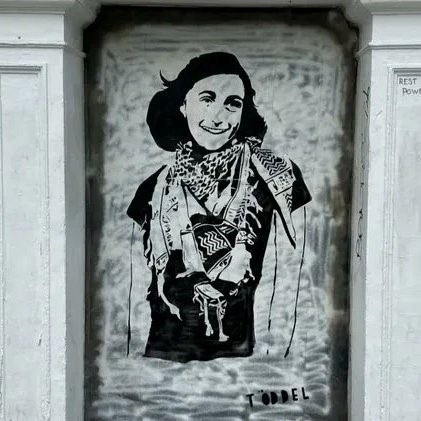
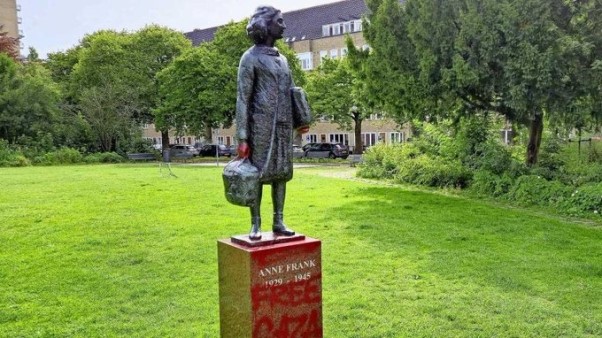
Incidentally, it is notable that while anti-Israel street art and online memes depict Anne Frank as a Palestinian, simultaneously her statue in Amsterdam gets defaced by anti-Israel protestors. The statue’s hands have even been daubed with blood-like red paint, as if her Jewish hands retroactively take on responsibility for Palestinian deaths. This dual treatment of Anne Frank as both a victim of genocide and a perpetrator suggests that, had she survived the Shoah and found refuge in Israel alongside so many other Holocaust survivors, she would have undergone moral metamorphosis from the archetypal victim to the archetypal oppressor. It is an apt metaphor for the unresolvable contradictions that the anti-Israel left brings to its treatment of Zionism, the Holocaust, Israel, and the modern Jewish story.
However, this revision of history does not just stop at Israel and Jews, nor is it only, or mainly, about changing our understanding of the past; as ever, it is really about putting history to work in trying to shape the future. In particular, this discourse aims to align an interpretation of the Holocaust with the anticolonialism that animates the progressive, anti-racist politics of the present generation. Mishra brackets the two together, writing of Nazism as “the radical ‘twin’ of imperialism” and pairing Auschwitz and Hiroshima as parallel sites of Western slaughter. There is an “obvious connection,” he says, “between the imperial slaughter of natives in the colonies and the genocidal terrors perpetrated against Jews inside Europe”; and while the world obsessively commemorates the Shoah, “the numerous late Victorian holocausts in Asia and Africa” are barely remembered.
It is true that there are historical links between the Holocaust and German genocidal actions in Namibia prior to World War One, but this argument is not limited to that specific connection. Instead, it falls into a broader analysis of the Shoah that sublimates its causes and meaning within the phenomenon of colonial conquest and the extinguishing of native populations by Western imperialist powers as a whole. The notion that the Holocaust is better explained, and understood, as an example of European colonialism playing out within the home continent rather than being exported overseas is common in left wing thinking. It is a theory that risks downplaying the centrality of antisemitism in Nazi ideology, as if the Jews were swept aside in the pursuit of Lebensraum simply as a matter of circumstance, along with Slavs and others whom the Nazis deemed inferior or inconvenient. This argument has obvious weak- nesses. The Nazi desire to clear so-called inferior races from the land that they had earmarked for their eastern Empire cannot explain why Jews from Paris, Amsterdam, or Thessaloniki were transported hundreds of miles into that same territory in the east before being killed; nor why French, Dutch, or Greek Jews had to be killed at all. The understanding of the Shoah as a manifestation of European colonialism is too limited and flawed to fully work as a convincing piece of historical analysis; but it serves a political purpose, more so now than ever.
This is where the current anticolonial zeitgeist gives new energy and an important focus to this particular form of left wing, anti-Zionist Holocaust relativization. The discourse of the post-October 7 anti-Israel movement, more than ever before, insists on turning the clock back to 1948 and attempting to reverse Israel’s creation in the name of decolo- nization. It is accepted almost without challenge within this movement that Israel is nothing more than a relic of European colonialism, a settler colonial state left behind by the receding tide of imperialism with no more intrinsic legitimacy or indigenous authenticity than French Algeria or British Rhodesia. This implies an objectionable distortion and denial of ancient Jewish history and modern Jewish culture that ought to delegitimize this argument from the start. However, within the politics of the anti-Israel left it is convenient to treat both the Holocaust and the Jewish State that emerged from its ashes as twin creations of the West’s original sin of colonialism, as if campaigning for the eradication of Israel and commemorating the Shoah are both expressions of the same desire to build a world free of racism, colonialism and genocide. As the West grapples with the different legacies of the Shoah and of Empire, this is one way to resolve the tension between Holocaust commemoration and anti-colonialism as two competing foundations for building a pluralist, multicultural society. However, this comes at a cost for Israel and its supporters in diaspora Jewish communities, who sit on the fault line of these competing historical narratives. if the Shoah provides the moral basis for the post-war system, and if Zionism is the legitimate national movement of the Holocaust’s primary victims, then Israel’s existence ought to be secured as a commitment to the future of the Jewish people. However, if the Shoah is supplanted by decolonization as the foundational event of the global order, and if Israel is a colonial state and Zionism a form of racism, then Israel’s existence in its present form becomes intolerable. The argument that the Shoah was itself a manifestation of European colonialism may be an attempt to synthesize these two positions, but it requires an unbearable twisting of the facts of history to make it work.
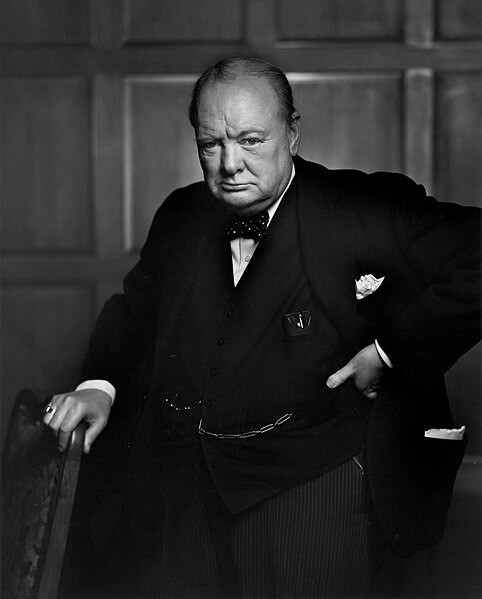
This reshaping of historical memory comes at a time when the history of World War Two is itself under challenge from right and left. An example of how these two revisionist streams come together can be found in their treatment of Winston Churchill, the historical figure who above any other embodies the myth and reality of western resistance to Nazi aggression. The left-wing revision of Churchill’s image, not as the savior of democracy but as a racist and an imperialist, is now familiar. What is interesting is that we are seeing a similar process on the right, even using the same source material. In September Tucker Carlson broadcast a lengthy interview with Darryl Cooper, a podcaster and blogger who Carlson described as America’s “best and most honest popular historian.”[13] During the interview, which at the time of writing has had almost 35 million views, Cooper declared that Winston Churchill was “the chief villain of the Second World War” because “he was primarily responsible for that war becoming what it did.” Churchill—not Hitler—“was the leader most intent on making it happen,” he has written.[14] Claiming that Churchill was the war’s “chief villain” can only mean that Hitler was not so bad by comparison. This view follows a pre-existing tradition on the American paleoconservative right: the late Joseph Sobran, for example, viewed Churchill as an anti-hero for choosing Stalin over Hitler. Cooper has been accused of Holocaust denial because he also argued in the same interview that the millions who died in Nazi camps after the Nazi inva- sion of the Soviet Union did so simply due to poor logistics rather than any genocidal intent. It’s an indication that there are multiple ways in which Holocaust denial can sneak into mainstream discussions of the Second World War, increasingly so if that denial is no longer presented as a neo-Nazi project.
The day after this interview was published a storm broke over both
Cooper and Carlson, and Cooper wrote a thread on X to justify his posi- tion; and what was striking about this thread was his use of a common, but always out-of-context, 1920s quote in which Churchill advocated “using poisoned gas against uncivilized tribes” in Iraq.[15] This quote is regularly thrown up by Churchill’s left wing critics to claim he was advocating the genocidal gassing of natives; and here it was, being put into service by someone on the right. In fact, Churchill was advocating the use of tear gas to disperse protests precisely because it was not fatal, and therefore preferable to more dangerous methods. But putting to one side the wider critique of Churchill’s support for imperialism and his racist views—which do have a factual validity—what is noteworthy for our purposes is the way that people on the right and the left are using the same source material to condemn him. Why should these opposing political camps share an interest in discrediting the most totemic figure of twentieth century democratic resistance to totalitarianism?
The answer, as Pankaj Mishra correctly observed in his article, is that the international norms and institutions that emerged out of the Second World War, some of which were developed in response to the Holocaust, are under significant stress now, as are the liberal democratic values that are so closely associated with them. There are crises everywhere: Russia’s invasion of Ukraine, China’s rise, the decline of Western Europe, and the retreat of American power. Mishra places Israel’s war in Gaza—with all of its regional ramifications—at the top of this list, even though conflict between Israel and its neighbors is not new, and therefore may be less credible as an explanation for why this is suddenly happening right now. If these institutions and norms are to fall, there will be intense competition over what will replace them: in fact, with the rise of populism and authoritarianism around the globe, one might very well argue that this competition is already well under way.
This is where the effort to wrest the legacy of the Holocaust away from Israel, and by extension from Jews, has wider meaning within the hardnosed geopolitics of today. The world is going through profound political change, and the shifting politics of our time involves a battle of narratives just as much as a battle of economic or military forces. The argument that the moral and political (if not actual) victims of the Holo- caust are no longer the Jews but the Palestinians is not only a rhetorical attack on Zionism but an assault on Western political dominance, and has a role to play in this wider struggle over the direction of global poli- tics. The notion that controlling the legacy and memory of the Shoah is the key to shaping the future world order may seem fanciful; but it is yet another reminder that the Jewish people are often turned into props with an inflated and unmerited role in how other people make sense of their world. In this regard, as with so much else, the Shoah is not exempt.
It is a paradox of the Holocaust that it weighs so heavily in our moral world that we are compelled to draw lessons from it, yet it was such a singular crime that any comparisons are bound to mislead. Theodor Adorno’s categorical imperative demanded that people should “arrange their thoughts and actions so that Auschwitz will not repeat itself, so that nothing similar will happen.” This insistence on historical and moral accountability should not be taken as a licence to distort and manipulate the Shoah to fit the political needs of today; but perhaps, given how much is at stake, this is a naïve hope.
[1] susan abulhawa, ‘I Went to What I Saw Was a Holocaust,’ Novara Media (18 October 2024)
[2] Rivkah Brown, 'Discontent Deepens Among Guardian Staff Over Palestine 'Double Standard,'' Novara Media (18 October 2024).
[3] For example, Andrew Roberts, ‘What Makes Hamas Worse Than the Nazis,’ Washington Free Beacon (24 November 2023).
[4] Taken from ‘Himmler’s Speech At Posen, October 4, 1943,’ Holocaust Historical Society https://www.holocausthistoricalsociety.org.uk/contents/naziseasternempire/himmlersspeechchatposen.html
[5] Philip Oltermann, ‘Uproar after Mahmoud Abbas in Berlin accuses Israel of ‘50 Holocausts,’’ The Guardian (17 August 2022); Hamas Charter available at https://avalon.law.yale.edu/20th_century/hamas.asp
[6] Pankaj Mishra, ‘The Shoah After Gaza’, London Review of Books 46 No. 6 (21 March 2024). All further Mishra quotes are from the same source.
[7] Améry, who was for a while in the Belgian resistance, was himself a victim of torture at the hands of the Gestapo before being transported to Auschwitz. His resistance to Nazi rule in Belgium was limited to producing and distributing subversive leaflets; rather different from the murder, rape and kidnapping that characterised Hamas’s ‘resistance’ to Israel on October 7.
[8] Jean Améry, Essays On Antisemitism, Anti-Zionism, And The Left, ed. Marlene Gallner (Indiana University Press, 2021), p. 86.
[9] Améry, p. 52.
[10] Améry, p. 49.
[11] Améry, p. 38.
[12] David Nirenberg, ‘Anti-Judaism, critical thinking and the possibility of history,’ K. (26 September 2024).
[13] https://x.com/TuckerCarlson/status/1830652074746409246
ABOUT THE AUTHOR: Dr. Dave Rich is author of Everyday Hate: How Antisemitism Is Built Into Our World and How You Can Change It (Biteback, 2024) and The Left’s Jewish Problem: Jeremy Corbyn, Israel and Antisemitism (Biteback, 2018). He is Director of Policy at the Community Security Trust, a British non-profit that seeks to protect the UK Jewish community from antisemitism, terrorism and extremism, is a Research Fellow at the London Centre for the Study of Contemporary Antisemitism, and is on the editorial board of the Journal of Contemporary Antisemitism. His academic work includes chapters and articles about hate crime, conspiracy theories, the abuse of Holocaust memory, anti-Israel boycotts, campus antisemitism and the campaign for Soviet Jewry. Dave blogs regularly about antisemitism and related topics at his personal Substack, https://everydayhate.substack.com/.